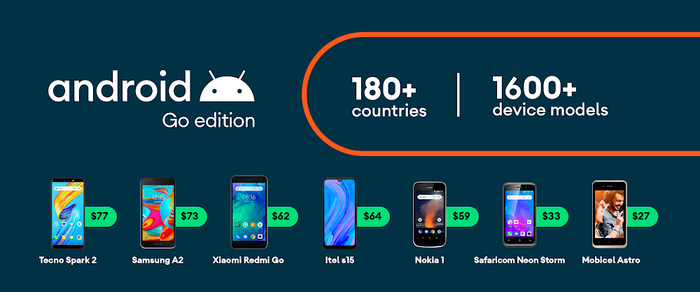Google updates Android for entry-level smartphones to be faster and saferGoogle updates Android for entry-level smartphones to be faster and safer
Google has announced a new version of Android Go, claiming the updated operating system for entry-level smartphones will run apps faster and support new data encryption technology.
September 26, 2019

Google has announced a new version of Android Go, claiming the updated operating system for entry-level smartphones will run apps faster and support new data encryption technology.
The update will take the stripped-down OS to Android 10 (Go Edition). The company claimed the new version will load apps 10% faster then the current iteration, Android 9 (Go Edition).
Android Go was first introduced on top of Android Oreo (Android 8) at the end of 2017. At that time the target was for entry-level Android phones with 1 GB RAM or less. Despite the threshold has risen to 1.5 GB RAM for the latest version, the memory demand is still much lower than those on mid-range or high-end phones. As a comparison, Pixel 3, Google’s own signature smartphone, has 4 GB RAM, while Samsung’s Galaxy S10 and Huawei P30 both have 8 GB RAM.
The new version of OS can also run a native encryption software, called Adiantum, which was launched by Google at the beginning of the year. Google said running Adiantum on Android 10 (Go Edition) will not affect the devices’ performance. Unlike earlier data encryption tools, Adiantum does not need specialist hardware, therefore all entry-level Android phones can command a similar experience.
A number of Google services are also optimised for Android 10 Go. The “Read-out-loud” feature, which was first introduced in 2018, is updated. So is Lens for Google Go that can read out texts on signs and pictures, supported by on-board AI.
There is also the new Gallery Go, which essentially is the light-weight version of Google Photos. The software is only 10MB in size and can use on-board AI to help users sort and arrange pictures
Thanks to its business model, Google has little control over the user experience on the plethora of devices launched by the hundreds of Android OEMs, most of which would modify the OS one way or another. It has tried reining in the fragmentation, especially on the low-end. Sundar Pichai, the current Google CEO, was leading the Android One program, a version of Android that cannot be customised by OEMs. It was initially designed for entry-level Android phones in the Indian market, but has since been expanded to mid- to high-end products. Only a handful of OEMs, primarily Xiaomi, Nokia (HMD), and Motorola, have taken it seriously though.
Google believes the Android Go momentum is stronger and the appeal is broader. It said over 1,600 device models from more than 500 OEMs have been launched with Android Go over the last 18 months. These have made up over 80% of the total entry-level Android phone market, with wholesale prices ranging from $27 to $77.

About the Author
You May Also Like










.png?width=300&auto=webp&quality=80&disable=upscale)


_1.jpg?width=300&auto=webp&quality=80&disable=upscale)